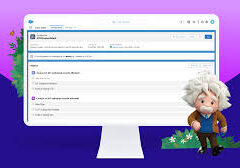Agents are autonomous software systems that assist users by reasoning, planning, and taking actions based on user input or environmental conditions. These digital assistants combine expert knowledge with access to relevant data to achieve specific tasks or goals, resembling intelligent digital assistants in their function and scope.
Agents are poised to become integral to everyday life, reshaping how businesses operate and engage with customers. For instance, a service agent can act as a company’s most knowledgeable support representative, available around the clock. A marketing agent, similar to a self-driving car, can respond to real-time business conditions by proactively adjusting pricing or launching campaigns.
This article explores the AI advancements driving the rise of agents and how these systems are transforming businesses while revolutionizing software development.
Powered by Large Language Models (LLMs)
Agents are powered by large language models (LLMs), which provide two key capabilities:
- Deep Language Understanding: LLMs excel at interpreting complex language, enabling chatbot-style agents to deeply understand user requests and respond in natural language.
- Reasoning and Decision-Making: LLMs allow agents to plan and orchestrate actions, solving problems based on their understanding of the situation.
However, LLMs alone have limitations, including:
- No Access to Private Data: LLMs cannot access private data such as open sales opportunities or campaign results unless specifically integrated.
- No Built-in Action Capability: LLMs cannot perform actions like opening support tickets or updating orders without an additional software layer.
A New Software Paradigm
Agents bridge the gap between the language capabilities of LLMs and the practical needs of businesses, introducing a new approach to software. Instead of building full-fledged applications, companies can develop granular building blocks of functionality, referred to as actions, which can be orchestrated by agents. In Salesforce, these actions (such as “Locate Order” or “Change Order Address”) are grouped under functional areas known as topics (e.g., “Order Management”).
An agent operates by:
- Understanding the Task: It uses LLMs to deeply comprehend the task.
- Iterative Planning and Execution: The agent reasons through available actions, executing steps or asking clarifying questions as needed until the task is completed.
- Providing a Response: It then delivers the final result or response based on the task.
The Ultimate Application Composition Platform
This new paradigm allows agents to handle requests that weren’t anticipated in advance, solving problems on the fly by composing actions in novel ways. For example, Salesforce’s Agentforce agents can access a wide range of actions across Sales Cloud, Service Cloud, Marketing Cloud, Commerce Cloud, and more. Developers can further extend the agents’ capabilities with custom actions built via code, APIs, or prompt templates.
Agents gain essential capabilities through actions, including:
- Access to Private Data: Actions enable agents to interact with enterprise data securely, governed by permissions and sharing models.
- Ability to Take Action: Agents can execute logic and integrate with external systems. Custom actions can also be built for Salesforce or other systems using APIs, flows, or code.
Levels of Autonomy
Agents can operate at varying levels of autonomy:
- Assistive Agents (Copilots): These agents collaborate with humans, enhancing capabilities with input and feedback.
- Autonomous Agents: Fully independent agents, like Agentforce Agents, can perform tasks with the ability to hand off work to humans if needed.
Regardless of their autonomy, establishing guardrails is essential for maintaining reliability, security, and business practices. Agentforce uses a multi-layered approach to enforce these guardrails, including the Einstein Trust Layer, which secures LLM interactions, and Agentforce Analytics, which provides insights into performance and reliability.
Ready-to-Use Agents for Sales and Service
Salesforce has introduced prebuilt agents, including:
- Agentforce Service Agent: Automates service requests and enhances efficiency by handling a wide range of issues without predefined scenarios.
- Agentforce SDR Agent: Engages with inbound leads autonomously, answering questions and booking meetings for sales teams.
- Agentforce Sales Coach Agent: Simulates customer interactions to train sales teams on discovery, pitch, and negotiation scenarios.
Creating and Customizing Agents with Agentforce
Salesforce’s Agentforce empowers users to create, customize, and deploy agents that combine AI, data, and actions. Key components of this platform include:
- Metadata: Establishes universal rules for data access and security across traditional applications and agents.
- Data Cloud: Unifies all relevant data—internal and external—ensuring high-quality data for AI agents.
- Models: Provides a configurable model architecture to plug in various AI models, allowing for rapid innovation.
- Einstein Trust Layer: Ensures safe AI interactions by masking data, enforcing zero-retention policies, and detecting harmful content.
- Actions and Topics: Enable agents to perform business functions by executing logic and integrating with external systems.
- Tooling: Low-code tools like Prompt Builder, Agent Builder, and Model Builder streamline the creation and management of agents.
Conclusion: Transforming Business with Agentforce Agents
Agents are becoming pervasive, changing how businesses operate by enabling systems to reason, take action, and provide personalized experiences. Agentforce Agents lead this transformation by being:
- Trusted: Protected by robust security features like the Einstein Trust Layer.
- Powerful: Drawing on Salesforce’s industry-leading applications to enhance business functions.
- Grounded in Unified Data: Delivering more relevant outcomes with harmonized data from Salesforce’s Data Cloud.
- Low-Code-Driven: Built, customized, and managed using user-friendly, low-code tools.
As businesses evolve, Agentforce Agents are at the forefront of creating a more efficient, intelligent future.













